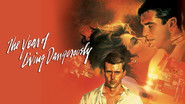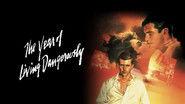tomgillespie2002
Peter Weir's The Year of Living Dangerously is now an Australian classic and, along with the likes of Panic at Hanging Rock and Gallipoli, helped establish Weir as a film-maker to watch our for and eased his inevitable transition to Hollywood. Living Dangerously may now be a more obviously flawed film in 2017 than it was back in '82, but it still retains a sense of raw power stemming from an uncanny sense of place and danger. The setting is Indonesia, 1965, and President Sukarno's grasp on power is quickly fading. It's the eve of his overthrowing by the military and the communist purge that quickly followed, and journalists in Jakarta huddle in sweaty bars, feeding on scraps thrown to them by Sukarno, knocking back beers and chasing tail to pass the time.The last guy left in a hurry, so young Australian foreign correspondent Guy Hamilton (Mel Gibson) arrives in Jakarta without a single informant or friend to lean on. The diplomats and fellow journalists who inhabit the same bar every night take no pity on him, but sympathetic Chinese-Australian dwarf named Billy Kwan sees something in the handsome, chain-smoking young man and decides to help him. Kwan believes strongly in Sukarno, the President his own people has dubbed the 'Puppet Master' due to his ability to keep the peace between the Communist Party and the military, and that he will save his poverty-stricken people from starvation. As well as setting up a key interview for the young journalist, he also introduces Hamilton to Jill Bryant (Sigourney Weaver), a beautiful assistant working for the British embassy. As the conflict heats up and the stories become juicier and more perilous, Hamilton must choose between his job, his lover and his close friend.The flaws of The Year of Living Dangerously are more apparent now, 35 years after its release, as the idea of cinema's tendency to 'whitewash' is now more openly discussed. It becomes clear very quickly that the most interesting character in the film is Billy Kwan. He has a much more personal attachment to the events playing out, and proves a more charismatic screen presence than Gibson's blander outsider. He is also played astonishingly well by Linda Hunt, the only actor to win an Academy Award for the playing a character of the opposite sex. When Kwan retreats into the background around the half-way mark, the focus shifts to the blossoming romance between Hamilton and Bryant, and the film becomes far less interesting in the process. However, there are some terrific individual scenes. The initial excitement of shooting a violent protest quickly gets out of hand, and a horrifyingly tense slow-drive through a heavily-armed road-block will leave you holding your breath. Yet it's difficult to shake the feeling that Weir's movie would have been far more absorbing with Kwan as the driving force at its centre.
sharky_55
Weir's fascination with the mystical and magical has taken him to places where most filmmakers would never dare to venture for fear of obscuring or losing the audience. He is Australian and maintains that connection through many of his films, but has also stepped out of this comfort zone and into the international; away from the cultural cringe and tall poppy syndrome that raided our media and arts for so long and I think still to an extent does so. Weir is a good choice, perhaps not just for the geographical proximity of Australia to Indonesia and how he understands how to use the landscape as a way of building character (see The Last Wave), but also for the way in which the expatriate stumbles in his navigation of the new environment, buffeted by the cultural shift and on permanent unease and wariness. We sense this is something that Weir is quite familiar with. A young Gibson is therefore perfect for the role of Guy Hamilton; an immature, fresh-faced reporter thrust into a role a great deal more important than himself, he has that vitality and zest that you cannot get with an older portrayal. Most people have gone through the same period - the one in which your future aspirations aim higher than the clouds and you feel ready to change the world. Guy is rough on the edges and easily distracted when he sees the white jewel in a murky, foreign forest, but initially, perhaps, he has those qualities. To the extent that he maintains them is where we lose track a little, but he shows enough promise to be taken under the wing by the local veteran, Billy Kwan, diminutive in stature but not in courage. Linda Hunt's portrayal has been praised widely and deservedly - she in herself has created so many layers of sexual ambiguity and mystery that aren't explored, and ultimately the character is reduced to a rather pointless sacrificial lamb (she dies for a tiny, insignificant cause which leads nowhere except to highlight the moral danger that is all around this politically charged country), but she has done more than enough to keep us guessing long after her demise. Kwan is an extension of Weir's mystical; less person or dwarf, and more a creature of great passion and emotional capability that feels a sense of moral debt to those around him and goes to great lengths to pay it off. She is almost positioned on another layer from the narrative itself at times; the cryptic voice-over revisiting its own plans and devices and muttering on the happenings and progress of these...like a guide that introduces you to a strange, new world at the beginning of a video game only to chastise and take back its godlike power when you stray down the wrong path or kill the wrong targets. But the message itself seems contradictory. Kwan bestows great responsibility and opportunity onto Guy - including positioning him with a make or break story that could potentially save many lives. But he also criticises him for his nobler intentions; he would give up the whole world for Jill, he claims, and has mistakenly thought that Guy too would do the same. Eventually he does go along those lines. After a rather tame rise to the challenge that rewards him with a busted eye, he rationalises that his love for Jill is more important and scurries away. Is it wrong to expect more of a character in this situation? The film poses so many questions of its political environment but shys away from answering all but the trivial ones. Weir's vision is limited by its caricatures, and in the end the noble white man has not even risen to the challenge, but run away from it (hand in hand with the fair maiden). And Weir, incredulously, frames this as an epiphany, as a coming to the senses.
leplatypus
If this movie hadn't be so humanist, i think my vote would have been « 4 » instead of « 7 » as it's however plagued. You are thrown in Indonesia but without any information of the date (i deduce it was around 1963 because i read it on a phone-book) or briefing about the political situation : You understand that it involves communists but it's only after one hour that their opposition is said to be Muslim ! Next, the movie begins as news investigation, but suddenly turns into a blinding passion thats leads to a final mixing (and choosing) between this two paths. Another dubious choice was to put an unannounced romantic, dreamy Vangelis song in an action scene ! I won't speak about choosing an actress to play Mel's buddy as i discovered the fact by reading the credits (Billy Kwan … Linda Hunt !). However, the movie has really a generous consideration and it's a change of nowadays propaganda : the fate of the Indonesian people is the main subject and their poverty, their hunger and bad health are exposed. In opposition, the luxurious and privileged lives of the westerners that gather into the modern hotel or the diplomatic mansions are also depicted. So, the political labels aren't really important and the killings of communist partisans is shocking as they are above all just poor peasants wanting a decent life. At last, Mel is a convincing newcomer and Sigourney is able to soften her stature to be charming.
AaronCapenBanner
Peter Weir directed this account of the Indonesian revolution of 1965, which sees inexperienced Australian foreign correspondent Guy Hamilton(played by Mel Gibson) covering this story, with the help of a dwarf photographer(played by Linda Hunt, who won a best supporting actress Academy Award playing a man!) who has come to care deeply about the country, though will feel betrayed by its outcome. Sigourney Weaver plays an embassy aide who becomes romantically involved with Guy, who also helps him with the story, though events will spiral out-of-control, endangering all their lives... Moderately interesting film has solid performances, though the story is unfocused, and only sporadically powerful. Still, mostly worthwhile.





